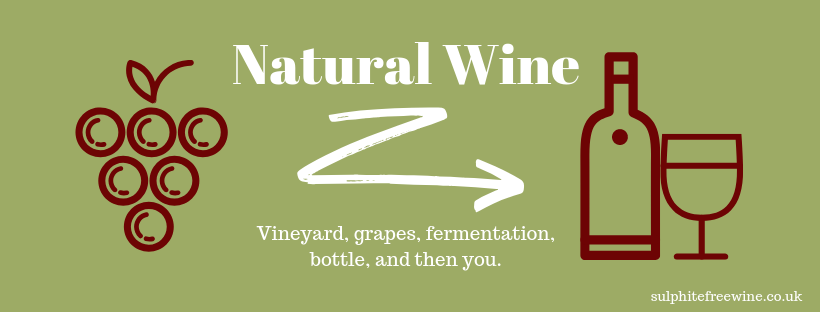Archives
October 2020
August 2020
June 2020
April 2020
January 2020
August 2019
July 2019
May 2019
August 2018
July 2018
May 2018
March 2018
November 2017
August 2017
February 2017
September 2016
January 2015
September 2014
July 2014
June 2014
May 2014
October 2013
July 2013
June 2013
May 2013
April 2013
March 2013
February 2013
January 2013
December 2012
November 2012
September 2012
August 2012
May 2012
April 2012
28 May 2019
The Definitive Guide to Natural Wine

If you’re reading this guide, you will have already done some research into natural wine. Or perhaps you’ve jumped onto the “natural” is better for you bandwagon – this might inspire you to get creative with your food products, but wine is often forgotten about.
As with most things in the world, not all wine is created equal. Natural wine is the prime example of this; an exclusive variety that can quite literally change with every single bottle – challenging the conventions of modern wines with every corking, what does wine look like? What should wine taste like? And how should wine be made?
What is natural wine?Defining natural wine is a delicate balancing act, much like the creation of the wine itself. There is no one universal definition of natural wine, but in the basic form – natural wine is grape juice which has been left to ferment into wine with no human intervention, nothing has been added and nothing has been taken away during the process. It is as nature intended it to be; no pesticides, chemicals or additives are used in the cellar. Natural wine can be brilliantly explained with a simple flow chart; vineyard, grapes, fermentation, bottle, and finally you – the consumer.

Why has natural wine suddenly peaked in popularity?
Whilst natural wine might seem like the new kid on the block when it comes to the latest trend in drinks, it’s actually been knocking about for a while now. Winemakers had become disillusioned with the industrialisation of the winemaking art form, so they went back to making wine the way that their grandparents did. The chief inspiration for this powerful movement of new winemakers were the prevalent teachings of Jules Chauvet, who during the 20th century, pioneered sulphur-free winemaking in Beaujolais.
The ideology of natural wine has spread like wildfire around the globe, this is evident in the many exclusive natural wine bars and restaurants who pour the bottled stuff exclusively. There are also natural wine fairs and festivals being held all over Europe, Australia and the U.S. Due to the hot topic nature of natural wines, they can be considered to be a bit of a conversation starter in the wine community as they lean on some of the controversial topics facing us in the modern day, such as; environmentalism, healthy living and the preservation of tradition and culture.
How to understand the basic vocabulary of natural wine
If you were to ask your local wine expert or sommelier about the natural wines that they recommend or just drink themselves, you might be reaching for your phone for some google translate help. Here are the four basic terms you should understand in order to know what it is you’re about to drink.
Sulphites – nearly all wines contain naturally occurring sulphites as they are formed during the fermentation process. Natural winemakers argue that adding in any extra can actually dull the wine’s vibrancy. Produces of wines that are considered to be low-sulphite, add to them only as required, whilst sulphite-free wines go completely unadorned.
Biodynamic – this is a set of farming principles that considers the vineyard as its own self-sustaining ecosystem. The levels of commitment shown to biodynamic farming can range from simply bio-curious to deeply committed to the earth and maintaining the delicate balance. The simple truth behind this method is, treating your grapes nicely will result in nice wine, simple.
Pét-nat – a carefree technique which has become a genre in its own right. If you want to talk technical, pét-nat is made when a wine is bottled before the fermentation is quite finished; and so it takes on a spirited fizz as it finishes up. It can be produced with almost any grape, it can be hazy and cloudy or clean and refined. It is the definition of party casual wine.
Is there an official certification for natural wine?
Unfortunately not. Unlike the lovely stamps and stickers found on the back labels of organic and biodynamic wines, there is no official certifying body for natural wine. This is somewhat of a point of contention in the wine industry, as some call for official certification in order to be transparent for their consumers. Whilst others believe that labelling natural wine and introducing rules and regulations would be a step away from the wines grassroots, anti-bureaucratic and rebellious spirit.
The best advice for finding natural wines is to find a wine shop or supplier you trust and get to know the owners/employees who can point you in the right direction. Nothing beats the knowledge of natural wine aficionados.
What do natural wines look and taste like?
Natural wines can range from being wild and funky to being exceptionally alive and complex, many are also very normal in style (you’ll find something you like). Some of the wilder natural wines might be a bit too much for your tongue to wrap around and they’re not necessarily for everyone, but with such a wide variety of flavours to choose from, you’ll have no trouble finding the right wine to get your taste buds singing.
Due to the generally lower alcohol levels, natural wines are versatile selections which can be equally enjoyed either on their own or accompanying food. Most natural wines, red and white alike, can benefit from some time in the fridge.
Some people may be put off by the general appearance of natural wine – as they are unfiltered and unrefined, they can often appear to be cloudy and have harmless sediment at the bottom of the bottle.
Can natural wine age?
For reasons that range from economics to low preservative level, many natural wines are designed to be enjoyed whilst they are young and vibrant. However, there are of course some natural wines, particularly those from some of the most seasoned producers which can age for years.
What are the health benefits of natural wine?
Natural wines are actually much better for your health as the chemicals used in the production of standard wine can be a contributing factor to a number of significant health problems, such as allergies. Wine allergies have been associated with a number of chemicals that enter during the winemaking process, some of the reactions to these chemicals include headaches, sinus issues, facial flushing and other negative symptoms.
It is also better for the environment; there is a direct focus on being a closed circuit, self-sustaining environment with the winemakers working hand-in-hand with nature rather than against it.
The powerful antioxidants in natural wine offer a multitude of health benefits, including; reducing the risk of heart attack, lowering the risk of heart disease, cutting the risk of developing cataracts, cutting colon cancer risk, lowering the risk of stroke and slowing brain decline.